Adolescent Breast Cancer: A Clinical Management Matrix Case Study
VerifiedAdded on 2023/06/04
|6
|2944
|333
Case Study
AI Summary
This case study provides a comprehensive clinical management matrix for adolescent breast cancer, detailing various stages from lifestyle risk factors and symptom appearance to investigations, acute hospitalizations, treatment units (chemotherapy, mastectomy, radiation), rehabilitation, home care, GP office visits, palliative care, and potential death. It emphasizes the importance of early detection, self-care management, and consulting healthcare professionals for treatment options like hormonal therapy, chemotherapy, lumpectomy, mastectomy, or radiation therapy. The matrix includes roles of various healthcare providers such as GPs, oncologists, breast care nurses, plastic reconstructive surgeons, physiotherapists, occupational therapists, dieticians, psychologists, pharmacists, and social workers, each contributing to physical, emotional, and psychological support. It further addresses the significance of community support, patient education, medication adherence, pain management, and end-of-life care, highlighting a multidisciplinary approach to ensure the best possible outcome and quality of life for adolescent breast cancer patients.

Running head: CLINICAL MANAGEMENT MATRIX
ASSESSMENT TASK 3
Name of the Student
Name of the University
Author Note
ASSESSMENT TASK 3
Name of the Student
Name of the University
Author Note
Paraphrase This Document
Need a fresh take? Get an instant paraphrase of this document with our AI Paraphraser
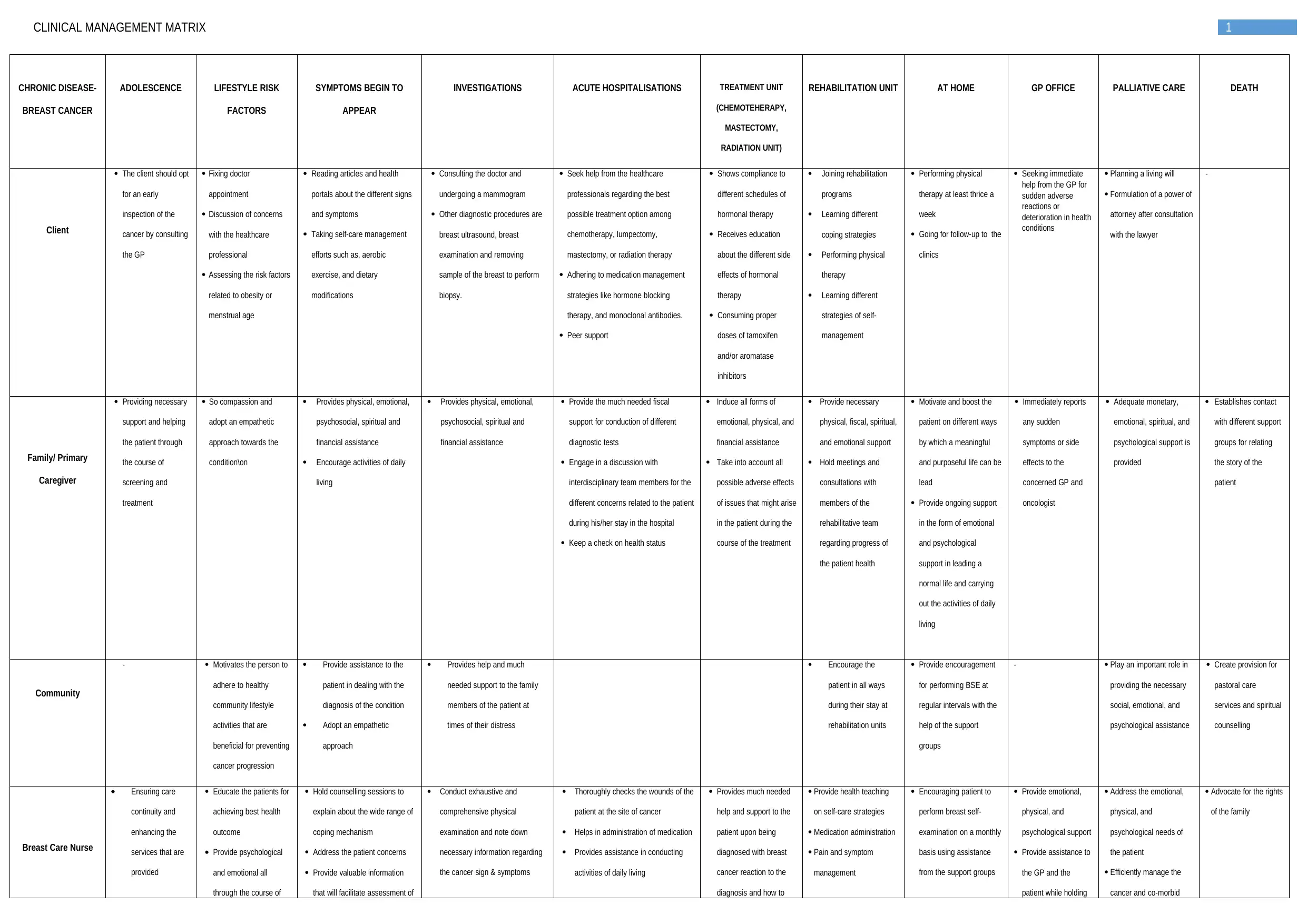
1CLINICAL MANAGEMENT MATRIX
CHRONIC DISEASE-
BREAST CANCER
ADOLESCENCE LIFESTYLE RISK
FACTORS
SYMPTOMS BEGIN TO
APPEAR
INVESTIGATIONS ACUTE HOSPITALISATIONS TREATMENT UNIT
(CHEMOTEHERAPY,
MASTECTOMY,
RADIATION UNIT)
REHABILITATION UNIT AT HOME GP OFFICE PALLIATIVE CARE DEATH
Client
The client should opt
for an early
inspection of the
cancer by consulting
the GP
Fixing doctor
appointment
Discussion of concerns
with the healthcare
professional
Assessing the risk factors
related to obesity or
menstrual age
Reading articles and health
portals about the different signs
and symptoms
Taking self-care management
efforts such as, aerobic
exercise, and dietary
modifications
Consulting the doctor and
undergoing a mammogram
Other diagnostic procedures are
breast ultrasound, breast
examination and removing
sample of the breast to perform
biopsy.
Seek help from the healthcare
professionals regarding the best
possible treatment option among
chemotherapy, lumpectomy,
mastectomy, or radiation therapy
Adhering to medication management
strategies like hormone blocking
therapy, and monoclonal antibodies.
Peer support
Shows compliance to
different schedules of
hormonal therapy
Receives education
about the different side
effects of hormonal
therapy
Consuming proper
doses of tamoxifen
and/or aromatase
inhibitors
Joining rehabilitation
programs
Learning different
coping strategies
Performing physical
therapy
Learning different
strategies of self-
management
Performing physical
therapy at least thrice a
week
Going for follow-up to the
clinics
Seeking immediate
help from the GP for
sudden adverse
reactions or
deterioration in health
conditions
Planning a living will
Formulation of a power of
attorney after consultation
with the lawyer
-
Family/ Primary
Caregiver
Providing necessary
support and helping
the patient through
the course of
screening and
treatment
So compassion and
adopt an empathetic
approach towards the
condition\on
Provides physical, emotional,
psychosocial, spiritual and
financial assistance
Encourage activities of daily
living
Provides physical, emotional,
psychosocial, spiritual and
financial assistance
Provide the much needed fiscal
support for conduction of different
diagnostic tests
Engage in a discussion with
interdisciplinary team members for the
different concerns related to the patient
during his/her stay in the hospital
Keep a check on health status
Induce all forms of
emotional, physical, and
financial assistance
Take into account all
possible adverse effects
of issues that might arise
in the patient during the
course of the treatment
Provide necessary
physical, fiscal, spiritual,
and emotional support
Hold meetings and
consultations with
members of the
rehabilitative team
regarding progress of
the patient health
Motivate and boost the
patient on different ways
by which a meaningful
and purposeful life can be
lead
Provide ongoing support
in the form of emotional
and psychological
support in leading a
normal life and carrying
out the activities of daily
living
Immediately reports
any sudden
symptoms or side
effects to the
concerned GP and
oncologist
Adequate monetary,
emotional, spiritual, and
psychological support is
provided
Establishes contact
with different support
groups for relating
the story of the
patient
Community
- Motivates the person to
adhere to healthy
community lifestyle
activities that are
beneficial for preventing
cancer progression
Provide assistance to the
patient in dealing with the
diagnosis of the condition
Adopt an empathetic
approach
Provides help and much
needed support to the family
members of the patient at
times of their distress
Encourage the
patient in all ways
during their stay at
rehabilitation units
Provide encouragement
for performing BSE at
regular intervals with the
help of the support
groups
- Play an important role in
providing the necessary
social, emotional, and
psychological assistance
Create provision for
pastoral care
services and spiritual
counselling
Breast Care Nurse
Ensuring care
continuity and
enhancing the
services that are
provided
Educate the patients for
achieving best health
outcome
Provide psychological
and emotional all
through the course of
Hold counselling sessions to
explain about the wide range of
coping mechanism
Address the patient concerns
Provide valuable information
that will facilitate assessment of
Conduct exhaustive and
comprehensive physical
examination and note down
necessary information regarding
the cancer sign & symptoms
Thoroughly checks the wounds of the
patient at the site of cancer
Helps in administration of medication
Provides assistance in conducting
activities of daily living
Provides much needed
help and support to the
patient upon being
diagnosed with breast
cancer reaction to the
diagnosis and how to
Provide health teaching
on self-care strategies
Medication administration
Pain and symptom
management
Encouraging patient to
perform breast self-
examination on a monthly
basis using assistance
from the support groups
Provide emotional,
physical, and
psychological support
Provide assistance to
the GP and the
patient while holding
Address the emotional,
physical, and
psychological needs of
the patient
Efficiently manage the
cancer and co-morbid
Advocate for the rights
of the family
CHRONIC DISEASE-
BREAST CANCER
ADOLESCENCE LIFESTYLE RISK
FACTORS
SYMPTOMS BEGIN TO
APPEAR
INVESTIGATIONS ACUTE HOSPITALISATIONS TREATMENT UNIT
(CHEMOTEHERAPY,
MASTECTOMY,
RADIATION UNIT)
REHABILITATION UNIT AT HOME GP OFFICE PALLIATIVE CARE DEATH
Client
The client should opt
for an early
inspection of the
cancer by consulting
the GP
Fixing doctor
appointment
Discussion of concerns
with the healthcare
professional
Assessing the risk factors
related to obesity or
menstrual age
Reading articles and health
portals about the different signs
and symptoms
Taking self-care management
efforts such as, aerobic
exercise, and dietary
modifications
Consulting the doctor and
undergoing a mammogram
Other diagnostic procedures are
breast ultrasound, breast
examination and removing
sample of the breast to perform
biopsy.
Seek help from the healthcare
professionals regarding the best
possible treatment option among
chemotherapy, lumpectomy,
mastectomy, or radiation therapy
Adhering to medication management
strategies like hormone blocking
therapy, and monoclonal antibodies.
Peer support
Shows compliance to
different schedules of
hormonal therapy
Receives education
about the different side
effects of hormonal
therapy
Consuming proper
doses of tamoxifen
and/or aromatase
inhibitors
Joining rehabilitation
programs
Learning different
coping strategies
Performing physical
therapy
Learning different
strategies of self-
management
Performing physical
therapy at least thrice a
week
Going for follow-up to the
clinics
Seeking immediate
help from the GP for
sudden adverse
reactions or
deterioration in health
conditions
Planning a living will
Formulation of a power of
attorney after consultation
with the lawyer
-
Family/ Primary
Caregiver
Providing necessary
support and helping
the patient through
the course of
screening and
treatment
So compassion and
adopt an empathetic
approach towards the
condition\on
Provides physical, emotional,
psychosocial, spiritual and
financial assistance
Encourage activities of daily
living
Provides physical, emotional,
psychosocial, spiritual and
financial assistance
Provide the much needed fiscal
support for conduction of different
diagnostic tests
Engage in a discussion with
interdisciplinary team members for the
different concerns related to the patient
during his/her stay in the hospital
Keep a check on health status
Induce all forms of
emotional, physical, and
financial assistance
Take into account all
possible adverse effects
of issues that might arise
in the patient during the
course of the treatment
Provide necessary
physical, fiscal, spiritual,
and emotional support
Hold meetings and
consultations with
members of the
rehabilitative team
regarding progress of
the patient health
Motivate and boost the
patient on different ways
by which a meaningful
and purposeful life can be
lead
Provide ongoing support
in the form of emotional
and psychological
support in leading a
normal life and carrying
out the activities of daily
living
Immediately reports
any sudden
symptoms or side
effects to the
concerned GP and
oncologist
Adequate monetary,
emotional, spiritual, and
psychological support is
provided
Establishes contact
with different support
groups for relating
the story of the
patient
Community
- Motivates the person to
adhere to healthy
community lifestyle
activities that are
beneficial for preventing
cancer progression
Provide assistance to the
patient in dealing with the
diagnosis of the condition
Adopt an empathetic
approach
Provides help and much
needed support to the family
members of the patient at
times of their distress
Encourage the
patient in all ways
during their stay at
rehabilitation units
Provide encouragement
for performing BSE at
regular intervals with the
help of the support
groups
- Play an important role in
providing the necessary
social, emotional, and
psychological assistance
Create provision for
pastoral care
services and spiritual
counselling
Breast Care Nurse
Ensuring care
continuity and
enhancing the
services that are
provided
Educate the patients for
achieving best health
outcome
Provide psychological
and emotional all
through the course of
Hold counselling sessions to
explain about the wide range of
coping mechanism
Address the patient concerns
Provide valuable information
that will facilitate assessment of
Conduct exhaustive and
comprehensive physical
examination and note down
necessary information regarding
the cancer sign & symptoms
Thoroughly checks the wounds of the
patient at the site of cancer
Helps in administration of medication
Provides assistance in conducting
activities of daily living
Provides much needed
help and support to the
patient upon being
diagnosed with breast
cancer reaction to the
diagnosis and how to
Provide health teaching
on self-care strategies
Medication administration
Pain and symptom
management
Encouraging patient to
perform breast self-
examination on a monthly
basis using assistance
from the support groups
Provide emotional,
physical, and
psychological support
Provide assistance to
the GP and the
patient while holding
Address the emotional,
physical, and
psychological needs of
the patient
Efficiently manage the
cancer and co-morbid
Advocate for the rights
of the family
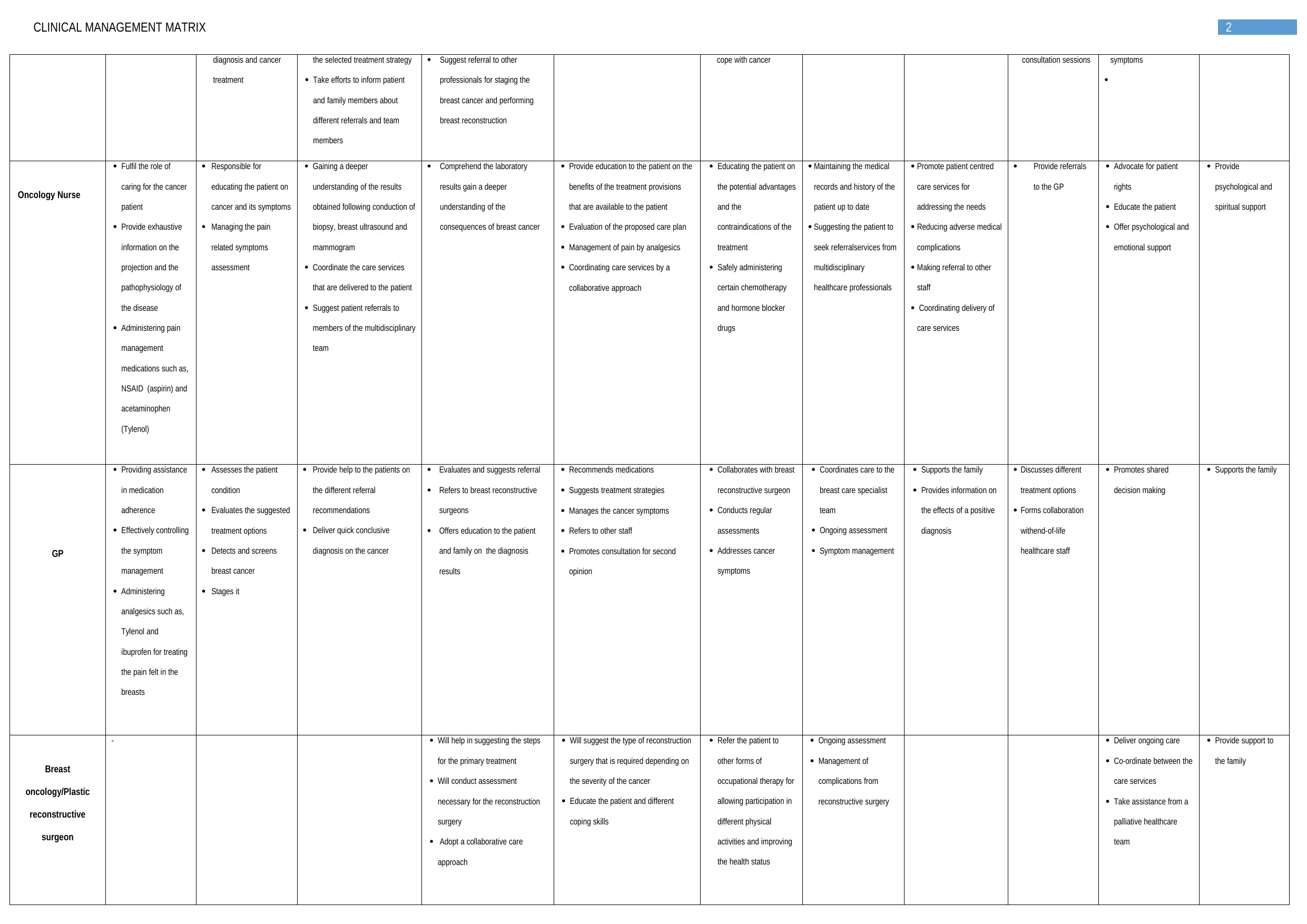
2CLINICAL MANAGEMENT MATRIX
diagnosis and cancer
treatment
the selected treatment strategy
Take efforts to inform patient
and family members about
different referrals and team
members
Suggest referral to other
professionals for staging the
breast cancer and performing
breast reconstruction
cope with cancer consultation sessions symptoms
Oncology Nurse
Fulfil the role of
caring for the cancer
patient
Provide exhaustive
information on the
projection and the
pathophysiology of
the disease
Administering pain
management
medications such as,
NSAID (aspirin) and
acetaminophen
(Tylenol)
Responsible for
educating the patient on
cancer and its symptoms
Managing the pain
related symptoms
assessment
Gaining a deeper
understanding of the results
obtained following conduction of
biopsy, breast ultrasound and
mammogram
Coordinate the care services
that are delivered to the patient
Suggest patient referrals to
members of the multidisciplinary
team
Comprehend the laboratory
results gain a deeper
understanding of the
consequences of breast cancer
Provide education to the patient on the
benefits of the treatment provisions
that are available to the patient
Evaluation of the proposed care plan
Management of pain by analgesics
Coordinating care services by a
collaborative approach
Educating the patient on
the potential advantages
and the
contraindications of the
treatment
Safely administering
certain chemotherapy
and hormone blocker
drugs
Maintaining the medical
records and history of the
patient up to date
Suggesting the patient to
seek referralservices from
multidisciplinary
healthcare professionals
Promote patient centred
care services for
addressing the needs
Reducing adverse medical
complications
Making referral to other
staff
Coordinating delivery of
care services
Provide referrals
to the GP
Advocate for patient
rights
Educate the patient
Offer psychological and
emotional support
Provide
psychological and
spiritual support
GP
Providing assistance
in medication
adherence
Effectively controlling
the symptom
management
Administering
analgesics such as,
Tylenol and
ibuprofen for treating
the pain felt in the
breasts
Assesses the patient
condition
Evaluates the suggested
treatment options
Detects and screens
breast cancer
Stages it
Provide help to the patients on
the different referral
recommendations
Deliver quick conclusive
diagnosis on the cancer
Evaluates and suggests referral
Refers to breast reconstructive
surgeons
Offers education to the patient
and family on the diagnosis
results
Recommends medications
Suggests treatment strategies
Manages the cancer symptoms
Refers to other staff
Promotes consultation for second
opinion
Collaborates with breast
reconstructive surgeon
Conducts regular
assessments
Addresses cancer
symptoms
Coordinates care to the
breast care specialist
team
Ongoing assessment
Symptom management
Supports the family
Provides information on
the effects of a positive
diagnosis
Discusses different
treatment options
Forms collaboration
withend-of-life
healthcare staff
Promotes shared
decision making
Supports the family
Breast
oncology/Plastic
reconstructive
surgeon
- Will help in suggesting the steps
for the primary treatment
Will conduct assessment
necessary for the reconstruction
surgery
Adopt a collaborative care
approach
Will suggest the type of reconstruction
surgery that is required depending on
the severity of the cancer
Educate the patient and different
coping skills
Refer the patient to
other forms of
occupational therapy for
allowing participation in
different physical
activities and improving
the health status
Ongoing assessment
Management of
complications from
reconstructive surgery
Deliver ongoing care
Co-ordinate between the
care services
Take assistance from a
palliative healthcare
team
Provide support to
the family
diagnosis and cancer
treatment
the selected treatment strategy
Take efforts to inform patient
and family members about
different referrals and team
members
Suggest referral to other
professionals for staging the
breast cancer and performing
breast reconstruction
cope with cancer consultation sessions symptoms
Oncology Nurse
Fulfil the role of
caring for the cancer
patient
Provide exhaustive
information on the
projection and the
pathophysiology of
the disease
Administering pain
management
medications such as,
NSAID (aspirin) and
acetaminophen
(Tylenol)
Responsible for
educating the patient on
cancer and its symptoms
Managing the pain
related symptoms
assessment
Gaining a deeper
understanding of the results
obtained following conduction of
biopsy, breast ultrasound and
mammogram
Coordinate the care services
that are delivered to the patient
Suggest patient referrals to
members of the multidisciplinary
team
Comprehend the laboratory
results gain a deeper
understanding of the
consequences of breast cancer
Provide education to the patient on the
benefits of the treatment provisions
that are available to the patient
Evaluation of the proposed care plan
Management of pain by analgesics
Coordinating care services by a
collaborative approach
Educating the patient on
the potential advantages
and the
contraindications of the
treatment
Safely administering
certain chemotherapy
and hormone blocker
drugs
Maintaining the medical
records and history of the
patient up to date
Suggesting the patient to
seek referralservices from
multidisciplinary
healthcare professionals
Promote patient centred
care services for
addressing the needs
Reducing adverse medical
complications
Making referral to other
staff
Coordinating delivery of
care services
Provide referrals
to the GP
Advocate for patient
rights
Educate the patient
Offer psychological and
emotional support
Provide
psychological and
spiritual support
GP
Providing assistance
in medication
adherence
Effectively controlling
the symptom
management
Administering
analgesics such as,
Tylenol and
ibuprofen for treating
the pain felt in the
breasts
Assesses the patient
condition
Evaluates the suggested
treatment options
Detects and screens
breast cancer
Stages it
Provide help to the patients on
the different referral
recommendations
Deliver quick conclusive
diagnosis on the cancer
Evaluates and suggests referral
Refers to breast reconstructive
surgeons
Offers education to the patient
and family on the diagnosis
results
Recommends medications
Suggests treatment strategies
Manages the cancer symptoms
Refers to other staff
Promotes consultation for second
opinion
Collaborates with breast
reconstructive surgeon
Conducts regular
assessments
Addresses cancer
symptoms
Coordinates care to the
breast care specialist
team
Ongoing assessment
Symptom management
Supports the family
Provides information on
the effects of a positive
diagnosis
Discusses different
treatment options
Forms collaboration
withend-of-life
healthcare staff
Promotes shared
decision making
Supports the family
Breast
oncology/Plastic
reconstructive
surgeon
- Will help in suggesting the steps
for the primary treatment
Will conduct assessment
necessary for the reconstruction
surgery
Adopt a collaborative care
approach
Will suggest the type of reconstruction
surgery that is required depending on
the severity of the cancer
Educate the patient and different
coping skills
Refer the patient to
other forms of
occupational therapy for
allowing participation in
different physical
activities and improving
the health status
Ongoing assessment
Management of
complications from
reconstructive surgery
Deliver ongoing care
Co-ordinate between the
care services
Take assistance from a
palliative healthcare
team
Provide support to
the family
⊘ This is a preview!⊘
Do you want full access?
Subscribe today to unlock all pages.

Trusted by 1+ million students worldwide
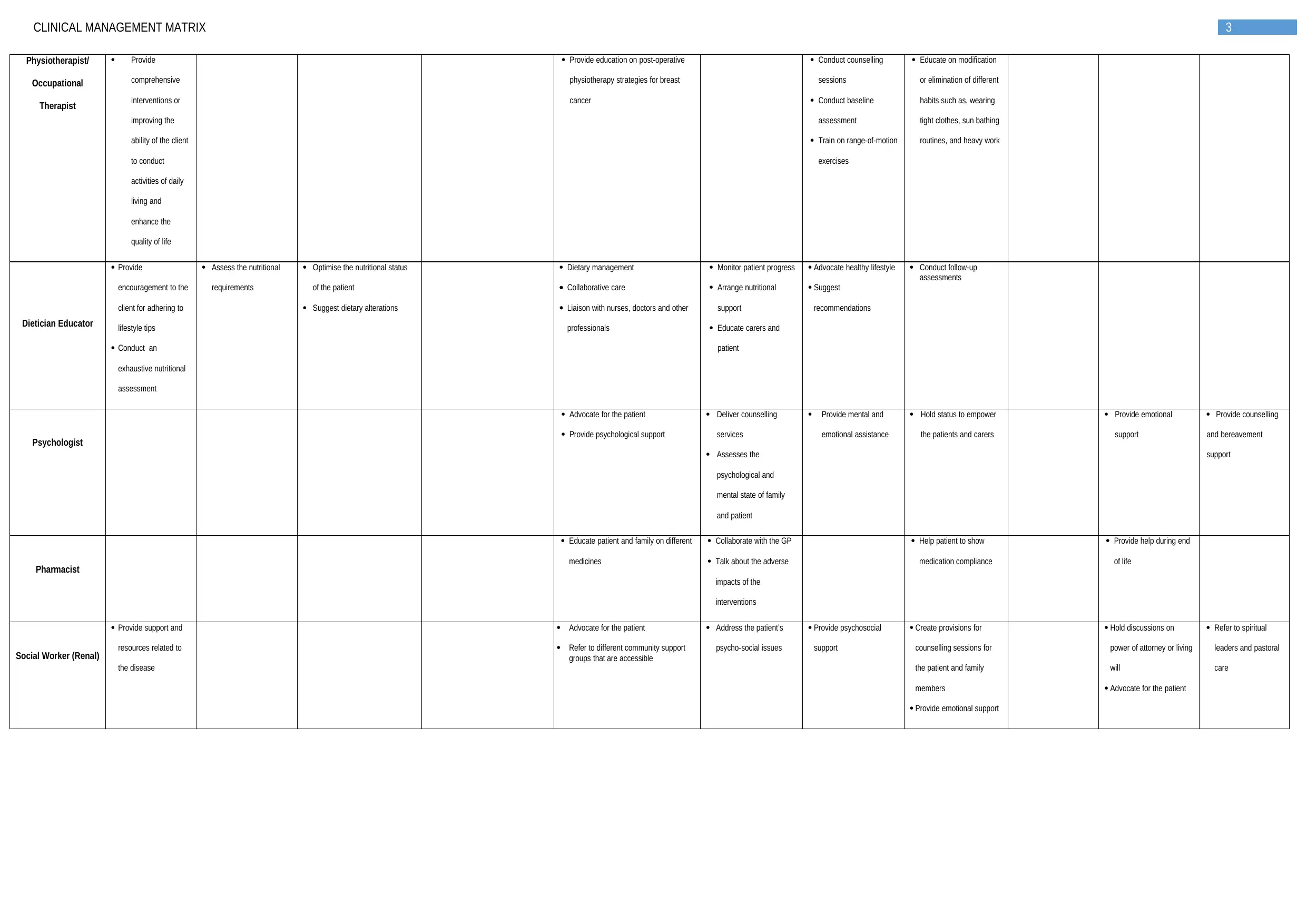
3CLINICAL MANAGEMENT MATRIX
Physiotherapist/
Occupational
Therapist
Provide
comprehensive
interventions or
improving the
ability of the client
to conduct
activities of daily
living and
enhance the
quality of life
Provide education on post-operative
physiotherapy strategies for breast
cancer
Conduct counselling
sessions
Conduct baseline
assessment
Train on range-of-motion
exercises
Educate on modification
or elimination of different
habits such as, wearing
tight clothes, sun bathing
routines, and heavy work
Dietician Educator
Provide
encouragement to the
client for adhering to
lifestyle tips
Conduct an
exhaustive nutritional
assessment
Assess the nutritional
requirements
Optimise the nutritional status
of the patient
Suggest dietary alterations
Dietary management
Collaborative care
Liaison with nurses, doctors and other
professionals
Monitor patient progress
Arrange nutritional
support
Educate carers and
patient
Advocate healthy lifestyle
Suggest
recommendations
Conduct follow-up
assessments
Psychologist
Advocate for the patient
Provide psychological support
Deliver counselling
services
Assesses the
psychological and
mental state of family
and patient
Provide mental and
emotional assistance
Hold status to empower
the patients and carers
Provide emotional
support
Provide counselling
and bereavement
support
Pharmacist
Educate patient and family on different
medicines
Collaborate with the GP
Talk about the adverse
impacts of the
interventions
Help patient to show
medication compliance
Provide help during end
of life
Social Worker (Renal)
Provide support and
resources related to
the disease
Advocate for the patient
Refer to different community support
groups that are accessible
Address the patient’s
psycho-social issues
Provide psychosocial
support
Create provisions for
counselling sessions for
the patient and family
members
Provide emotional support
Hold discussions on
power of attorney or living
will
Advocate for the patient
Refer to spiritual
leaders and pastoral
care
Physiotherapist/
Occupational
Therapist
Provide
comprehensive
interventions or
improving the
ability of the client
to conduct
activities of daily
living and
enhance the
quality of life
Provide education on post-operative
physiotherapy strategies for breast
cancer
Conduct counselling
sessions
Conduct baseline
assessment
Train on range-of-motion
exercises
Educate on modification
or elimination of different
habits such as, wearing
tight clothes, sun bathing
routines, and heavy work
Dietician Educator
Provide
encouragement to the
client for adhering to
lifestyle tips
Conduct an
exhaustive nutritional
assessment
Assess the nutritional
requirements
Optimise the nutritional status
of the patient
Suggest dietary alterations
Dietary management
Collaborative care
Liaison with nurses, doctors and other
professionals
Monitor patient progress
Arrange nutritional
support
Educate carers and
patient
Advocate healthy lifestyle
Suggest
recommendations
Conduct follow-up
assessments
Psychologist
Advocate for the patient
Provide psychological support
Deliver counselling
services
Assesses the
psychological and
mental state of family
and patient
Provide mental and
emotional assistance
Hold status to empower
the patients and carers
Provide emotional
support
Provide counselling
and bereavement
support
Pharmacist
Educate patient and family on different
medicines
Collaborate with the GP
Talk about the adverse
impacts of the
interventions
Help patient to show
medication compliance
Provide help during end
of life
Social Worker (Renal)
Provide support and
resources related to
the disease
Advocate for the patient
Refer to different community support
groups that are accessible
Address the patient’s
psycho-social issues
Provide psychosocial
support
Create provisions for
counselling sessions for
the patient and family
members
Provide emotional support
Hold discussions on
power of attorney or living
will
Advocate for the patient
Refer to spiritual
leaders and pastoral
care
Paraphrase This Document
Need a fresh take? Get an instant paraphrase of this document with our AI Paraphraser
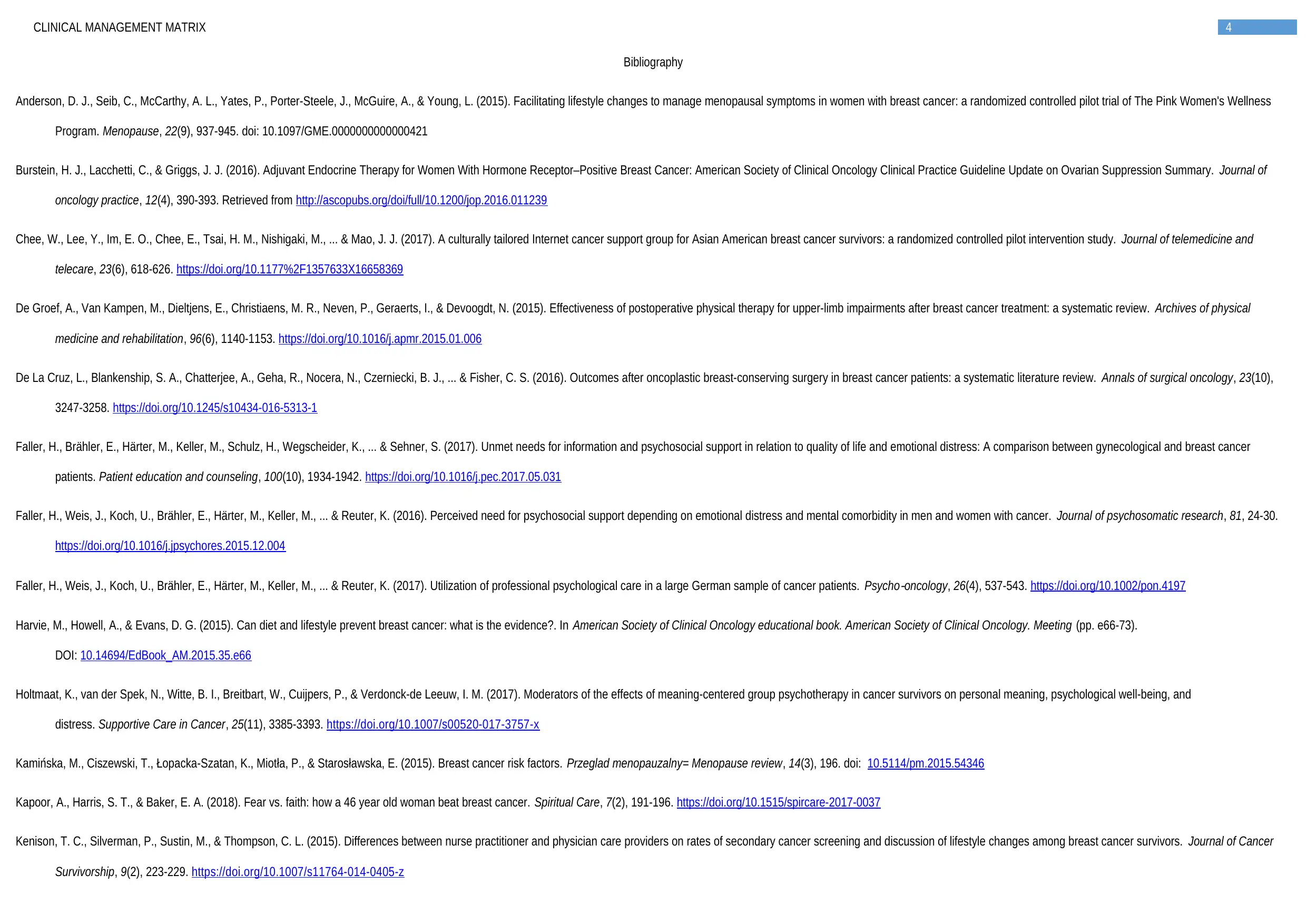
4CLINICAL MANAGEMENT MATRIX
Bibliography
Anderson, D. J., Seib, C., McCarthy, A. L., Yates, P., Porter-Steele, J., McGuire, A., & Young, L. (2015). Facilitating lifestyle changes to manage menopausal symptoms in women with breast cancer: a randomized controlled pilot trial of The Pink Women's Wellness
Program. Menopause, 22(9), 937-945. doi: 10.1097/GME.0000000000000421
Burstein, H. J., Lacchetti, C., & Griggs, J. J. (2016). Adjuvant Endocrine Therapy for Women With Hormone Receptor–Positive Breast Cancer: American Society of Clinical Oncology Clinical Practice Guideline Update on Ovarian Suppression Summary. Journal of
oncology practice, 12(4), 390-393. Retrieved from http://ascopubs.org/doi/full/10.1200/jop.2016.011239
Chee, W., Lee, Y., Im, E. O., Chee, E., Tsai, H. M., Nishigaki, M., ... & Mao, J. J. (2017). A culturally tailored Internet cancer support group for Asian American breast cancer survivors: a randomized controlled pilot intervention study. Journal of telemedicine and
telecare, 23(6), 618-626. https://doi.org/10.1177%2F1357633X16658369
De Groef, A., Van Kampen, M., Dieltjens, E., Christiaens, M. R., Neven, P., Geraerts, I., & Devoogdt, N. (2015). Effectiveness of postoperative physical therapy for upper-limb impairments after breast cancer treatment: a systematic review. Archives of physical
medicine and rehabilitation, 96(6), 1140-1153. https://doi.org/10.1016/j.apmr.2015.01.006
De La Cruz, L., Blankenship, S. A., Chatterjee, A., Geha, R., Nocera, N., Czerniecki, B. J., ... & Fisher, C. S. (2016). Outcomes after oncoplastic breast-conserving surgery in breast cancer patients: a systematic literature review. Annals of surgical oncology, 23(10),
3247-3258. https://doi.org/10.1245/s10434-016-5313-1
Faller, H., Brähler, E., Härter, M., Keller, M., Schulz, H., Wegscheider, K., ... & Sehner, S. (2017). Unmet needs for information and psychosocial support in relation to quality of life and emotional distress: A comparison between gynecological and breast cancer
patients. Patient education and counseling, 100(10), 1934-1942. https://doi.org/10.1016/j.pec.2017.05.031
Faller, H., Weis, J., Koch, U., Brähler, E., Härter, M., Keller, M., ... & Reuter, K. (2016). Perceived need for psychosocial support depending on emotional distress and mental comorbidity in men and women with cancer. Journal of psychosomatic research, 81, 24-30.
https://doi.org/10.1016/j.jpsychores.2015.12.004
Faller, H., Weis, J., Koch, U., Brähler, E., Härter, M., Keller, M., ... & Reuter, K. (2017). Utilization of professional psychological care in a large German sample of cancer patients. Psycho
‐oncology, 26(4), 537-543. https://doi.org/10.1002/pon.4197
Harvie, M., Howell, A., & Evans, D. G. (2015). Can diet and lifestyle prevent breast cancer: what is the evidence?. In American Society of Clinical Oncology educational book. American Society of Clinical Oncology. Meeting (pp. e66-73).
DOI: 10.14694/EdBook_AM.2015.35.e66
Holtmaat, K., van der Spek, N., Witte, B. I., Breitbart, W., Cuijpers, P., & Verdonck-de Leeuw, I. M. (2017). Moderators of the effects of meaning-centered group psychotherapy in cancer survivors on personal meaning, psychological well-being, and
distress. Supportive Care in Cancer, 25(11), 3385-3393. https://doi.org/10.1007/s00520-017-3757-x
Kamińska, M., Ciszewski, T., Łopacka-Szatan, K., Miotła, P., & Starosławska, E. (2015). Breast cancer risk factors. Przeglad menopauzalny= Menopause review, 14(3), 196. doi: 10.5114/pm.2015.54346
Kapoor, A., Harris, S. T., & Baker, E. A. (2018). Fear vs. faith: how a 46 year old woman beat breast cancer. Spiritual Care, 7(2), 191-196. https://doi.org/10.1515/spircare-2017-0037
Kenison, T. C., Silverman, P., Sustin, M., & Thompson, C. L. (2015). Differences between nurse practitioner and physician care providers on rates of secondary cancer screening and discussion of lifestyle changes among breast cancer survivors. Journal of Cancer
Survivorship, 9(2), 223-229. https://doi.org/10.1007/s11764-014-0405-z
Bibliography
Anderson, D. J., Seib, C., McCarthy, A. L., Yates, P., Porter-Steele, J., McGuire, A., & Young, L. (2015). Facilitating lifestyle changes to manage menopausal symptoms in women with breast cancer: a randomized controlled pilot trial of The Pink Women's Wellness
Program. Menopause, 22(9), 937-945. doi: 10.1097/GME.0000000000000421
Burstein, H. J., Lacchetti, C., & Griggs, J. J. (2016). Adjuvant Endocrine Therapy for Women With Hormone Receptor–Positive Breast Cancer: American Society of Clinical Oncology Clinical Practice Guideline Update on Ovarian Suppression Summary. Journal of
oncology practice, 12(4), 390-393. Retrieved from http://ascopubs.org/doi/full/10.1200/jop.2016.011239
Chee, W., Lee, Y., Im, E. O., Chee, E., Tsai, H. M., Nishigaki, M., ... & Mao, J. J. (2017). A culturally tailored Internet cancer support group for Asian American breast cancer survivors: a randomized controlled pilot intervention study. Journal of telemedicine and
telecare, 23(6), 618-626. https://doi.org/10.1177%2F1357633X16658369
De Groef, A., Van Kampen, M., Dieltjens, E., Christiaens, M. R., Neven, P., Geraerts, I., & Devoogdt, N. (2015). Effectiveness of postoperative physical therapy for upper-limb impairments after breast cancer treatment: a systematic review. Archives of physical
medicine and rehabilitation, 96(6), 1140-1153. https://doi.org/10.1016/j.apmr.2015.01.006
De La Cruz, L., Blankenship, S. A., Chatterjee, A., Geha, R., Nocera, N., Czerniecki, B. J., ... & Fisher, C. S. (2016). Outcomes after oncoplastic breast-conserving surgery in breast cancer patients: a systematic literature review. Annals of surgical oncology, 23(10),
3247-3258. https://doi.org/10.1245/s10434-016-5313-1
Faller, H., Brähler, E., Härter, M., Keller, M., Schulz, H., Wegscheider, K., ... & Sehner, S. (2017). Unmet needs for information and psychosocial support in relation to quality of life and emotional distress: A comparison between gynecological and breast cancer
patients. Patient education and counseling, 100(10), 1934-1942. https://doi.org/10.1016/j.pec.2017.05.031
Faller, H., Weis, J., Koch, U., Brähler, E., Härter, M., Keller, M., ... & Reuter, K. (2016). Perceived need for psychosocial support depending on emotional distress and mental comorbidity in men and women with cancer. Journal of psychosomatic research, 81, 24-30.
https://doi.org/10.1016/j.jpsychores.2015.12.004
Faller, H., Weis, J., Koch, U., Brähler, E., Härter, M., Keller, M., ... & Reuter, K. (2017). Utilization of professional psychological care in a large German sample of cancer patients. Psycho
‐oncology, 26(4), 537-543. https://doi.org/10.1002/pon.4197
Harvie, M., Howell, A., & Evans, D. G. (2015). Can diet and lifestyle prevent breast cancer: what is the evidence?. In American Society of Clinical Oncology educational book. American Society of Clinical Oncology. Meeting (pp. e66-73).
DOI: 10.14694/EdBook_AM.2015.35.e66
Holtmaat, K., van der Spek, N., Witte, B. I., Breitbart, W., Cuijpers, P., & Verdonck-de Leeuw, I. M. (2017). Moderators of the effects of meaning-centered group psychotherapy in cancer survivors on personal meaning, psychological well-being, and
distress. Supportive Care in Cancer, 25(11), 3385-3393. https://doi.org/10.1007/s00520-017-3757-x
Kamińska, M., Ciszewski, T., Łopacka-Szatan, K., Miotła, P., & Starosławska, E. (2015). Breast cancer risk factors. Przeglad menopauzalny= Menopause review, 14(3), 196. doi: 10.5114/pm.2015.54346
Kapoor, A., Harris, S. T., & Baker, E. A. (2018). Fear vs. faith: how a 46 year old woman beat breast cancer. Spiritual Care, 7(2), 191-196. https://doi.org/10.1515/spircare-2017-0037
Kenison, T. C., Silverman, P., Sustin, M., & Thompson, C. L. (2015). Differences between nurse practitioner and physician care providers on rates of secondary cancer screening and discussion of lifestyle changes among breast cancer survivors. Journal of Cancer
Survivorship, 9(2), 223-229. https://doi.org/10.1007/s11764-014-0405-z
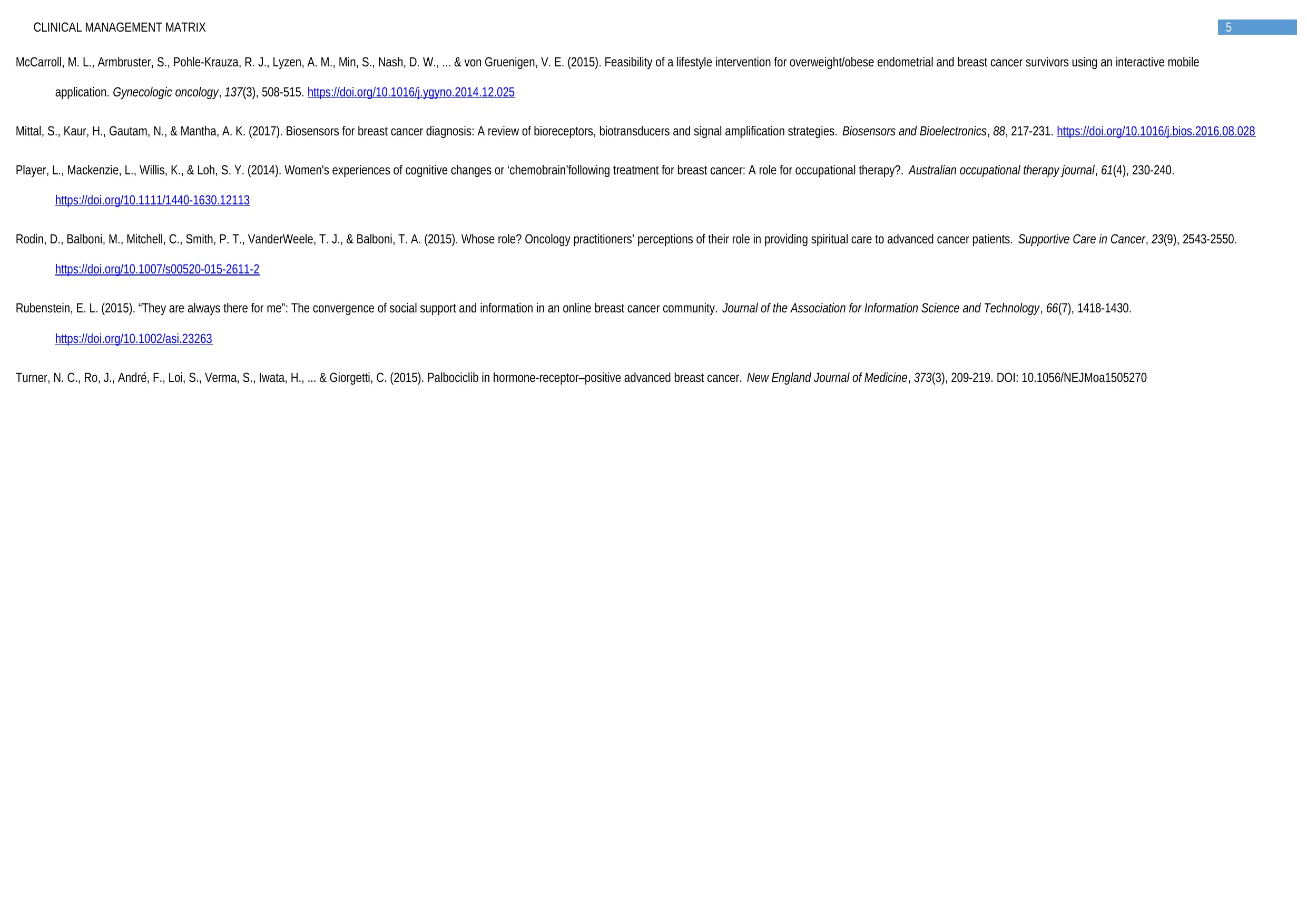
5CLINICAL MANAGEMENT MATRIX
McCarroll, M. L., Armbruster, S., Pohle-Krauza, R. J., Lyzen, A. M., Min, S., Nash, D. W., ... & von Gruenigen, V. E. (2015). Feasibility of a lifestyle intervention for overweight/obese endometrial and breast cancer survivors using an interactive mobile
application. Gynecologic oncology, 137(3), 508-515. https://doi.org/10.1016/j.ygyno.2014.12.025
Mittal, S., Kaur, H., Gautam, N., & Mantha, A. K. (2017). Biosensors for breast cancer diagnosis: A review of bioreceptors, biotransducers and signal amplification strategies. Biosensors and Bioelectronics, 88, 217-231. https://doi.org/10.1016/j.bios.2016.08.028
Player, L., Mackenzie, L., Willis, K., & Loh, S. Y. (2014). Women's experiences of cognitive changes or ‘chemobrain’following treatment for breast cancer: A role for occupational therapy?. Australian occupational therapy journal, 61(4), 230-240.
https://doi.org/10.1111/1440-1630.12113
Rodin, D., Balboni, M., Mitchell, C., Smith, P. T., VanderWeele, T. J., & Balboni, T. A. (2015). Whose role? Oncology practitioners’ perceptions of their role in providing spiritual care to advanced cancer patients. Supportive Care in Cancer, 23(9), 2543-2550.
https://doi.org/10.1007/s00520-015-2611-2
Rubenstein, E. L. (2015). “They are always there for me”: The convergence of social support and information in an online breast cancer community. Journal of the Association for Information Science and Technology, 66(7), 1418-1430.
https://doi.org/10.1002/asi.23263
Turner, N. C., Ro, J., André, F., Loi, S., Verma, S., Iwata, H., ... & Giorgetti, C. (2015). Palbociclib in hormone-receptor–positive advanced breast cancer. New England Journal of Medicine, 373(3), 209-219. DOI: 10.1056/NEJMoa1505270
McCarroll, M. L., Armbruster, S., Pohle-Krauza, R. J., Lyzen, A. M., Min, S., Nash, D. W., ... & von Gruenigen, V. E. (2015). Feasibility of a lifestyle intervention for overweight/obese endometrial and breast cancer survivors using an interactive mobile
application. Gynecologic oncology, 137(3), 508-515. https://doi.org/10.1016/j.ygyno.2014.12.025
Mittal, S., Kaur, H., Gautam, N., & Mantha, A. K. (2017). Biosensors for breast cancer diagnosis: A review of bioreceptors, biotransducers and signal amplification strategies. Biosensors and Bioelectronics, 88, 217-231. https://doi.org/10.1016/j.bios.2016.08.028
Player, L., Mackenzie, L., Willis, K., & Loh, S. Y. (2014). Women's experiences of cognitive changes or ‘chemobrain’following treatment for breast cancer: A role for occupational therapy?. Australian occupational therapy journal, 61(4), 230-240.
https://doi.org/10.1111/1440-1630.12113
Rodin, D., Balboni, M., Mitchell, C., Smith, P. T., VanderWeele, T. J., & Balboni, T. A. (2015). Whose role? Oncology practitioners’ perceptions of their role in providing spiritual care to advanced cancer patients. Supportive Care in Cancer, 23(9), 2543-2550.
https://doi.org/10.1007/s00520-015-2611-2
Rubenstein, E. L. (2015). “They are always there for me”: The convergence of social support and information in an online breast cancer community. Journal of the Association for Information Science and Technology, 66(7), 1418-1430.
https://doi.org/10.1002/asi.23263
Turner, N. C., Ro, J., André, F., Loi, S., Verma, S., Iwata, H., ... & Giorgetti, C. (2015). Palbociclib in hormone-receptor–positive advanced breast cancer. New England Journal of Medicine, 373(3), 209-219. DOI: 10.1056/NEJMoa1505270
⊘ This is a preview!⊘
Do you want full access?
Subscribe today to unlock all pages.

Trusted by 1+ million students worldwide
1 out of 6
Related Documents
Your All-in-One AI-Powered Toolkit for Academic Success.
+13062052269
info@desklib.com
Available 24*7 on WhatsApp / Email
![[object Object]](/_next/static/media/star-bottom.7253800d.svg)
Unlock your academic potential
Copyright © 2020–2026 A2Z Services. All Rights Reserved. Developed and managed by ZUCOL.





